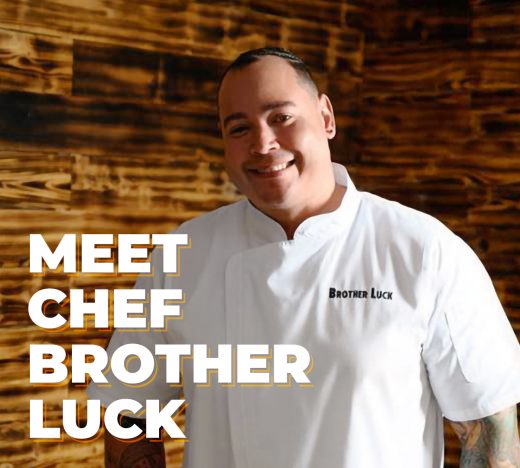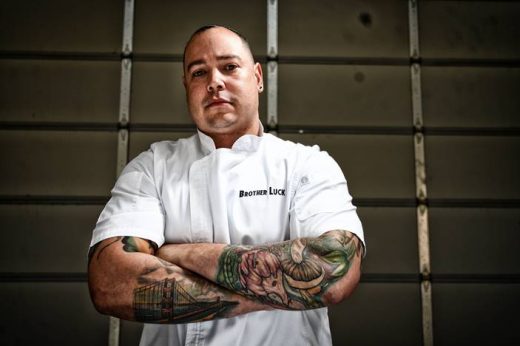
What has Chef Brother Luck learned over the course of his career? From the difference between ego and integrity to the 3 keys every chef must know — Chef Brother reveals his top gems. Whether you’re a business owner, a chef, or both, don’t miss this exclusive interview.
Chef Works: Can we start with your story and how you’ve gotten to where you are now?
Brother Luck: “My story is unique, but I think we all have unique stories. I think everyone has an amazing story they’re sometimes scared to share because they compare it to others. I’ve learned that my story is not meant for me; It’s meant for someone else to hear, which is why I love sharing. I got into food out of necessity. My father passed away when I was extremely young. My mother was removed from my life. So, I got into kitchens just because I wanted a steak sandwich. I was crashing on a bartender’s couch, getting paid under the table before I was 16 years old. That’s how I survived. At 16, I got put into a vocational school in Phoenix, Arizona. And that program was actually the first place where, as I now realize, I was introduced to positive male role models. These mentors were the first ones to give me positive reinforcement. So I became extremely connected and thirsty for that attention, which made me perform. So it kind of launched me into competitive cooking throughout my senior year of high school — winning scholarships to go to culinary school, and then pursuing a career in the hotel and hospitality industry. And here we are all these years later, as a business owner, as an entrepreneur, as a TV personality — you name it, all the above.”
CW: You have two restaurants — both with very unique back stories. Can you tell us about them, plus anything else you’re up to these days?
Brother Luck: “I’m currently the owner of three different concepts. I have Four by Brother Luck, which is an upscale Southwestern restaurant. Kind of tells the story of the Four Corners and the people of the Four Corners. Colorado, Utah, New Mexico, Arizona — this is the only place where four states touch. I love the history and the connection to the soil, so that’s really what that restaurant’s about. I have Lucky Dumpling, which is a homage and a tribute to growing up in San Francisco, growing up in Chinatown, me working under an amazing Chinese master chef and then getting to study in Japan and China and doing kaiseki food. So I found this cool bridge between Hong Kong and New Orleans where my family’s actually from, and the dependency of the bay and harbor and the water and how similar the cuisines actually work. So that’s what Lucky Dumpling is about. And then I have a studio, which is my private project where I entertain small groups. I do all my digital content up there. It’s kind of my own workshop. So I get to have a lot of fun out there. It’s a little bit more freedom. As far as TV, if there’s anything I’ve learned about television, it’s the entertainment industry, not the hospitality industry. Know the difference. If you want to be a chef on TV, then go to acting school, not culinary school.”

CW: What’s the story behind your name?
Brother Luck: “My father’s Creole and mother’s Cajun. ‘Brother’ was a nickname in my family until my father legally changed his name to Brother. Oh, yeah. It’s my birth name. It’s on my birth certificate, on my driver’s license. This is my real name. I literally introduce myself, “Hi, my name is Brother Luck — yes, that’s my real name.” That’s just kind of how it goes. It’s unique. Growing up, I was not a fan of my name because kids are cruel and I would usually end up in some type of altercation before lunchtime. But as an adult, I’ve learned to use it to my advantage and create a front porch to actually build conversations and rapport with people, but also stay memorable.”
CW: What has helped define who you are over the course of your career, personally and professionally?
Brother Luck: “Personally — my wife and I started our business almost 10 years ago and we’re still on our own. No investors, no partners. Just us, which is absolutely amazing. But as we’ve progressed forward, growing the business is crazy. Because you have this idea — I want to start a business, I want to make change, I want to do things differently, I want to do things my way — and you can’t do that until it’s your money. As I grew, I really struggled with protecting culture. I live a certain way, I have a certain way I feel about things. You have to constantly protect that, especially as your staff gets larger. And it’s been one of the hardest pieces that I’ve learned as a business owner personally. Professionally — I’ve done so many cool things in my career. Studying in Japan, getting to tour China, being nominated for a James Beard Award, cooking on Top Chef fights. Right now, I’m getting ready to release my book.* It’s a motivational memoir based on providing hope to those who feel hopeless.”
*Editor’s note: This book has since been released! Check it out here.
CW: Speaking of your upcoming book, can you tell us more about that?
Brother Luck: “The book is called No Lucks Given. You know, it’s really about perseverance. It’s my favorite word. Because you have to make a decision that you want to persevere through a challenge. And that requires determination, that requires courage, that requires a lot of passion — and my story is built on that.”
CW: When it comes to balancing your core values with providing for your customers, are there any pieces of wisdom you’ve learned from your time in the hospitality industry?
Brother Luck: “I would say understand the difference between integrity and ego. I turned down Guy Fieri years ago to do his TV show, and it was out of ego. I felt like I was much better than the caliber chefs that got to do that show. And I missed out on an extremely unique business opportunity that could have brought tons of revenue to my staff, that could have helped us grow our business much faster. And I had a mentor who told me, ‘You need to understand the difference between your integrity and your ego’ — and I never forgot that. So I think when it comes to dealing with customers, when it comes to dealing with staff, I still have to remember my integrity. Who am I as a person? What are my values? And do we instill that across the board? And if we don’t, you have to deal with the confrontation. You have to deal with the uncomfortable. You have to deal with it; Do not ignore it, because ignoring the problem doesn’t make it go away.”
CW: What’s a golden nugget of wisdom you’d like to share for young or aspiring chefs?
Brother Luck: “There is no true game. There’s no true roadmap when it comes to pursuing a career in culinary arts or hospitality. I would encourage a young chef or aspiring chef to focus more on understanding the business. You have to understand three key pieces. One, you have to understand people. How to treat people, how to guide people, how to mentor people, how to discipline people, how to talk to people. The second piece is the finances. You have to understand the money, right? How money gets made, how money gets spent, and what you do with what’s leftover at the end of the day. Money is extremely important. If it doesn’t make dollars, it doesn’t make sense. So don’t be afraid to focus on the business because without money, there is no staff. There is no food. There is no restaurant, you have to have the dollars. And then the third part really is your craft. You’ve got to constantly stay humble, because somebody always knows more than you, right? You can spend your entire career studying food — and you barely scratched the surface. There’s too many cultures. There’s too many ingredients. There’s too many people. There’s too many years of knowledge to ever feel like you could know it all. So you’ve got to let that go and really stay humble.”
CW: Can you also share about your experience with Chef Works products?
Brother Luck: “My first introduction to Chef Works was as a culinary competitor on my college competition team. I was on the student ACF team and we were sponsored, and I thought it was the coolest thing to see the Chef Works embroidery and logo on my coat. And throughout the years I’ve maintained this relationship. Even as I got to travel through Asia, Chef Works actually sponsored all my chef coats, so I have all these different chef coats for each city I was going to work in. It built my pride — and I think that’s where something is very powerful, right? You’re making someone feel good about themselves when they’re wearing something that’s cool and hip and looks good. I think that’s a key piece. You gotta feel good about yourself and Chef Works does exactly that.”


